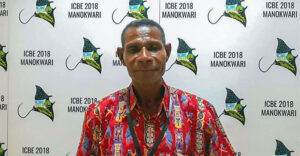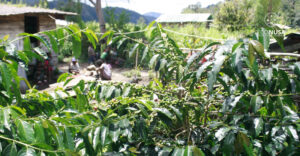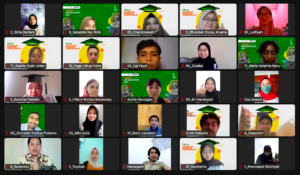
When Raja Ampat tourism in West Papua made public in 2003, foreign tourists commonly booked diving package in some resorts at Dampier Strait which was managed by migrants in collaboration with local peoples. Divers usually seek the view of wobegong, walking shark (Hemiscyllium freycinetti), mini horse sea (Hippocampus spp) and stingray fish Manta birostris). Besides, there are also many tourists are eager to see the dancing cenderawasih bird at natural forest in Sapokren Village. Up to 2010, there are many more resorts managed by migrants outside Papua. The limited local people management of natural resources turns to be challenging obstacle. In such a condition, local people only become bystander on their homeland.
In 2012, a group of young peoples in Dampier Strait were aware of the condition and then established a Homestay Association. The association plans to bolster economic status of the local peoples by giving civic space to discuss on business and locals’ lives. Kristian Sauyai, the Association coordinator, said, “Thanks God, young villagers seemed to get fresh water sprayed on their faces that made them aware to build homestay in their own villages.” To date, with professional management, tourists can book homestay online from stayrajaampat.com. In its early years, the association could only earn around IDR20-30 milion per year from homestay. “By online marketing, the income has grown far higher,” said Kristian.
Up to now, the Homestay Association has 150 units of homestay at 10 villages located in Waigeo, Batanta, and Misool Islands. Through concrete action, EcoNusa Foundation in cooperation with the Association worked on annual plans including training program on homestay management.
Homestay Association has made far better income currently. Tourist booking with down payment can reach IDR1 billion per month. However, the operational cost could spend around IDR600 million in two weeks. “But for the trainings, we are ready for funding sharing to a training on homestay management on 4-6 April 2020 in Saporkren Village,” said Kristian.
With the current progress, the community has been more enthusiastic to preserve sea and forest in Dampier Strait and other places surrounding their homestay. According to Marcel Mambrasar, the Diving Master from Arborek Village who hosts homestay guests every day, said that the coral ecosystem surrounding his village is getting healthier. Moreover, coral rehabilitation with high destructive potentials has been done while training young people to conserve environment. “This is very crucial, pace (Sir). If our coral is destroyed, there will be no more tourists coming to our place,” said Marcel.
Similarly, Orgenes Dimara, one of the owners of homestay, said that forest ecosystem in Waigeo Island, particularly behind the Saproken Village, should be preserved so that red cenderawasih bird (paradisea rubra) remain free dancing as if fairy from heaven. “We should maintain our forest so as to lure more tourists to see cenderawasih bird. When the forest is destroyed, bird will disappear and our income is gone,” said Orgenes.
Editor: Leo Wahyudi







